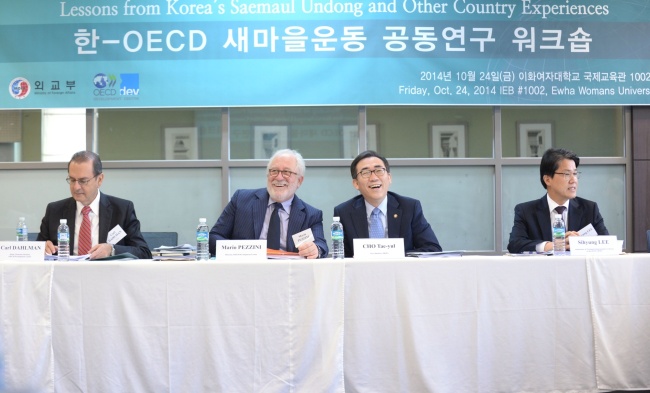‘Saemaeul Undong’ tapped for underdeveloped regions
By Shin Hyon-heePublished : Oct. 26, 2014 - 21:40
Korea’s policymakers and international organizations have stressed the significance of rural development as a top priority in tackling poverty around the globe, as they assess the country’s experience and ways to promote it elsewhere.
Their remarks came at a workshop hosted by the Foreign Ministry and the Organization for Economic Cooperation and Development at Ewha Womans University in Seoul on Friday. The session was designed to look into Korea’s Saemaeul Undong, an agricultural and rural reform drive in the 1970-80s, and compare it with other cases such as in Southeast Asia and Africa.
Some 40 officials took part, including those with the Korea International Cooperation Agency, the U.N. Development Program, France’s Centre de Cooperation Internationale en Recherche Agronomique pour le Developpement and other agencies at home and abroad.
Their remarks came at a workshop hosted by the Foreign Ministry and the Organization for Economic Cooperation and Development at Ewha Womans University in Seoul on Friday. The session was designed to look into Korea’s Saemaeul Undong, an agricultural and rural reform drive in the 1970-80s, and compare it with other cases such as in Southeast Asia and Africa.
Some 40 officials took part, including those with the Korea International Cooperation Agency, the U.N. Development Program, France’s Centre de Cooperation Internationale en Recherche Agronomique pour le Developpement and other agencies at home and abroad.

The one-day event was a precursor to a joint study by the OECD Development Center and Seoul to address challenges faced with developing countries and summarize some elements of strategies that may help them execute sustainable rural development, focusing on the Saemaeul Undong. Based on the findings of the project, the institution plans to provide a policy toolkit late next year.
“In order to extract some stylized examples of rural development policy, we can identify what countries have done ― most of all, we can identify the crucial elements in characteristics of these policies,” said Mario Pezzini, director of the center.
Controversy persists over the legitimacy of the Park Geun-hye government’s push for the Saemaeul campaign, which was first championed by her late father, longtime strongman Park Chung-hee.
Yet, a growing list of developing countries are keen to take a page from Korea’s development book, picking the movement as a model case, officials here say. In 2013 alone, 26 countries requested Seoul to transfer related know-how, including Myanmar, Sri Lanka and Uganda, according to the ministry.
The two-year survey was also initiated in January after the Paris-based OECD’s proposal for systematic, interdisciplinary research on the drive and its theorization. The Korean government pledged $1 million for this project.
“Korea’s experience is quite unique ― impressive, but unique. One of the things is that Korea started with much stronger initial conditions,” said Carl Dahlman, director of the center’s thematic division, citing higher basic education, land reform and industrialization strategies.
Yet he acknowledged that the project faces challenges acquiring basic data on investments and outputs, as well as on additional rural development programs, in light of the big time lag.
“We’re trying to understand better the many specific elements of the Saemaeul program and their outcome, and other rural development and contextual factors, which is important to draw lessons for applications of the Korean experience to other countries,” Dahlman said in his presentation.
Despite recent improvement, a lack of interest in rural development has held back global efforts to eradicate poverty, Vice Foreign Minister Cho Tae-yul said, calling it a “missing link.”
He pointed out even the U.N.’s Millennium Development Goals did not draw a particular distinction between urban and rural areas, though 75 percent of the world’s poorest people live in the latter.
“Rural development is closely interlinked not only with food security and nutrition, but also with the cross-cutting issues for poverty reduction such as gender equality, education, and maternal and child health,” Cho said in his keynote speech.
Revisiting Saemaeul Undong is in line with such an increased recognition of the importance of agricultural and rural development. (Now more developing countries) recognize that rural development is a critical link to poverty reduction.”
By Shin Hyon-hee (heeshin@heraldcorp.com)








![[Hello India] Hyundai Motor vows to boost 'clean mobility' in India](http://res.heraldm.com/phpwas/restmb_idxmake.php?idx=644&simg=/content/image/2024/04/25/20240425050672_0.jpg&u=)










